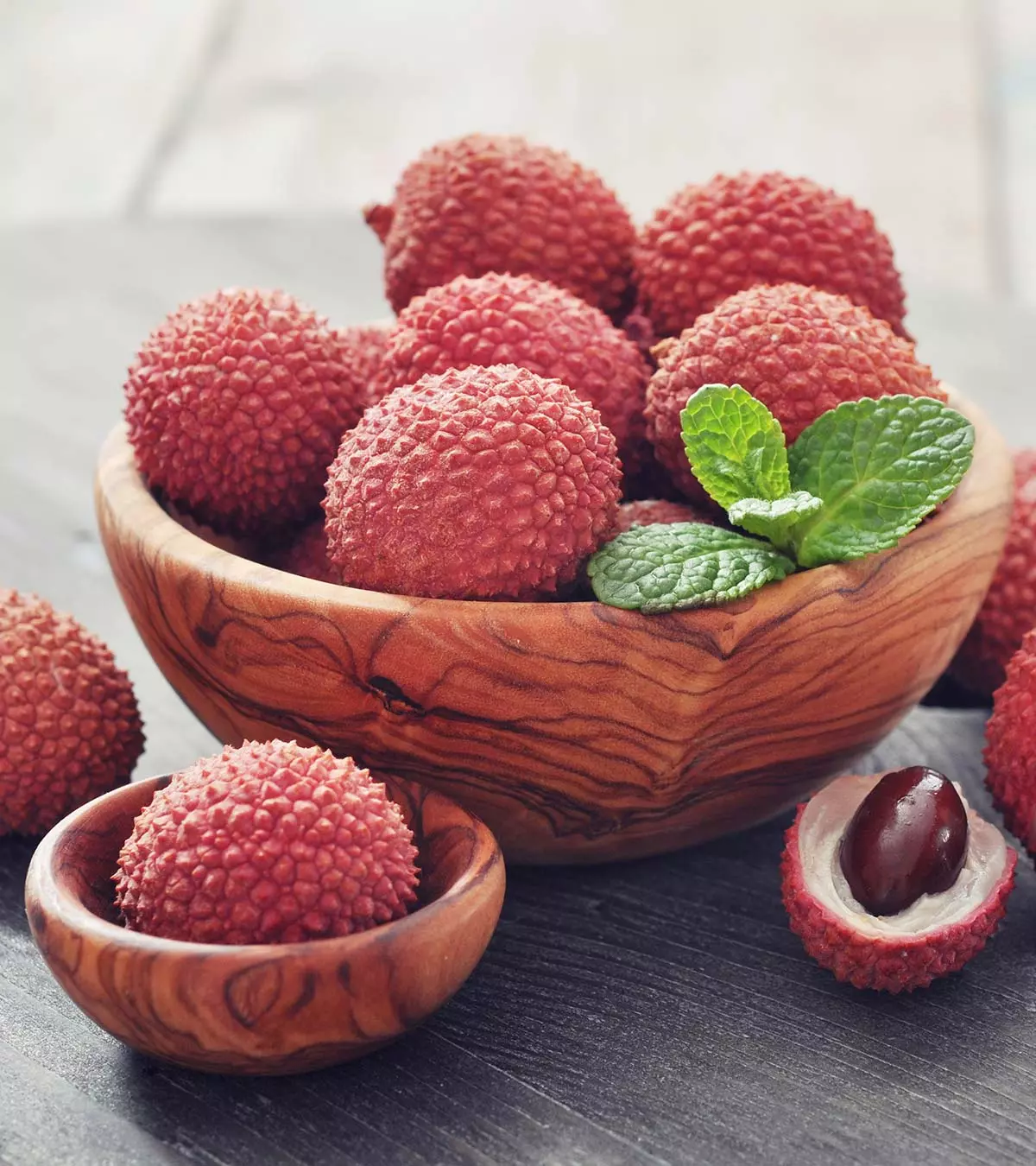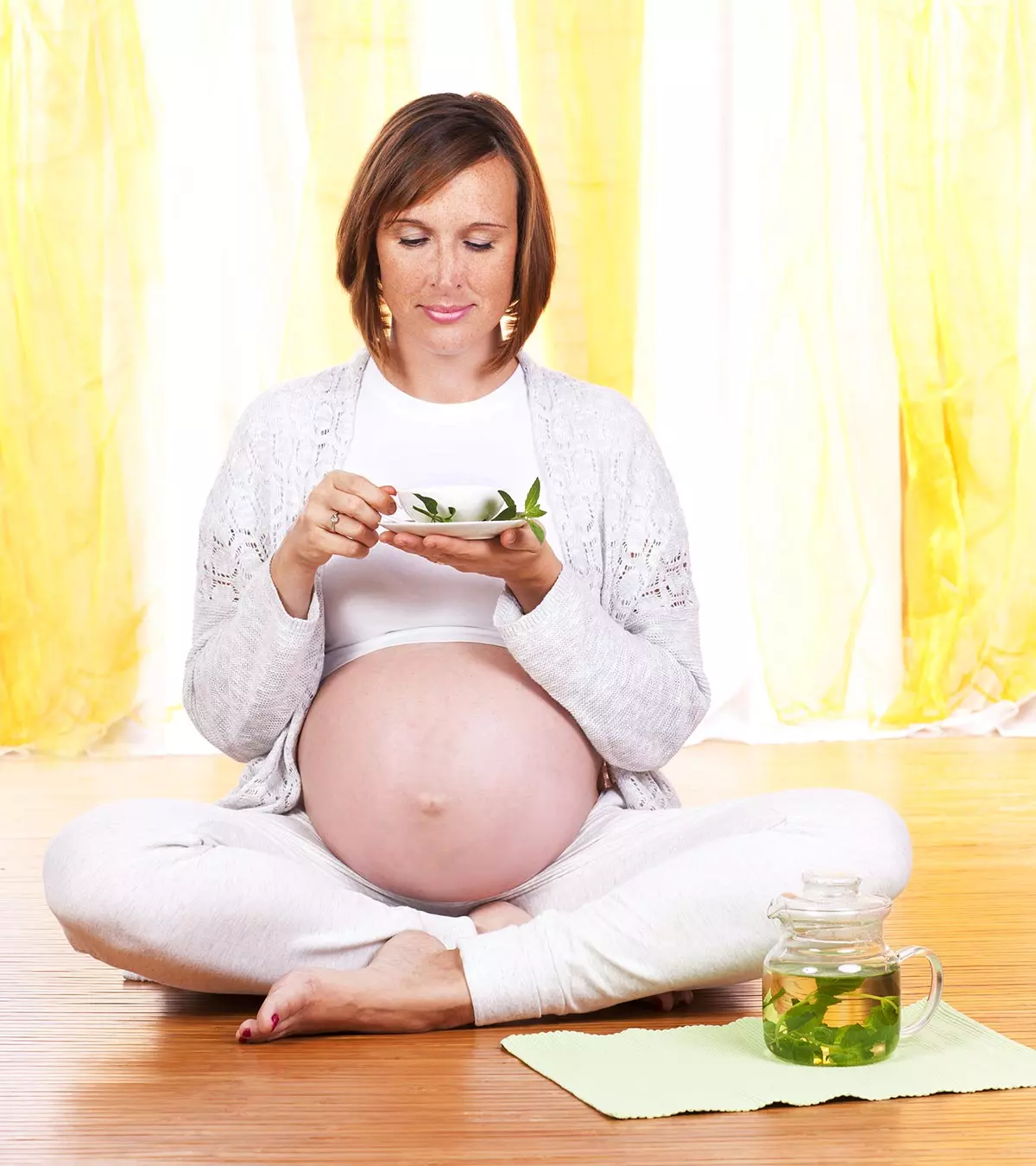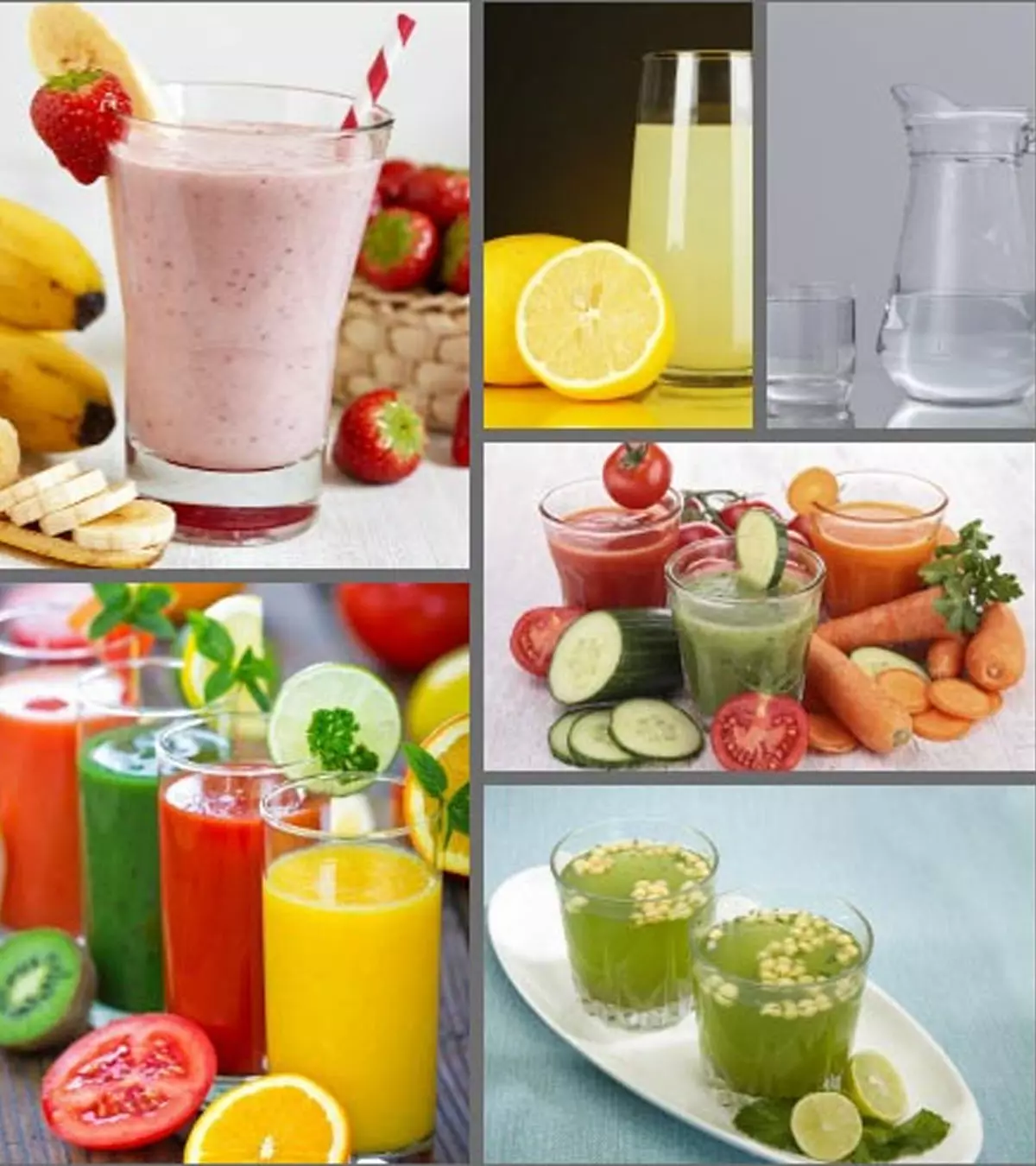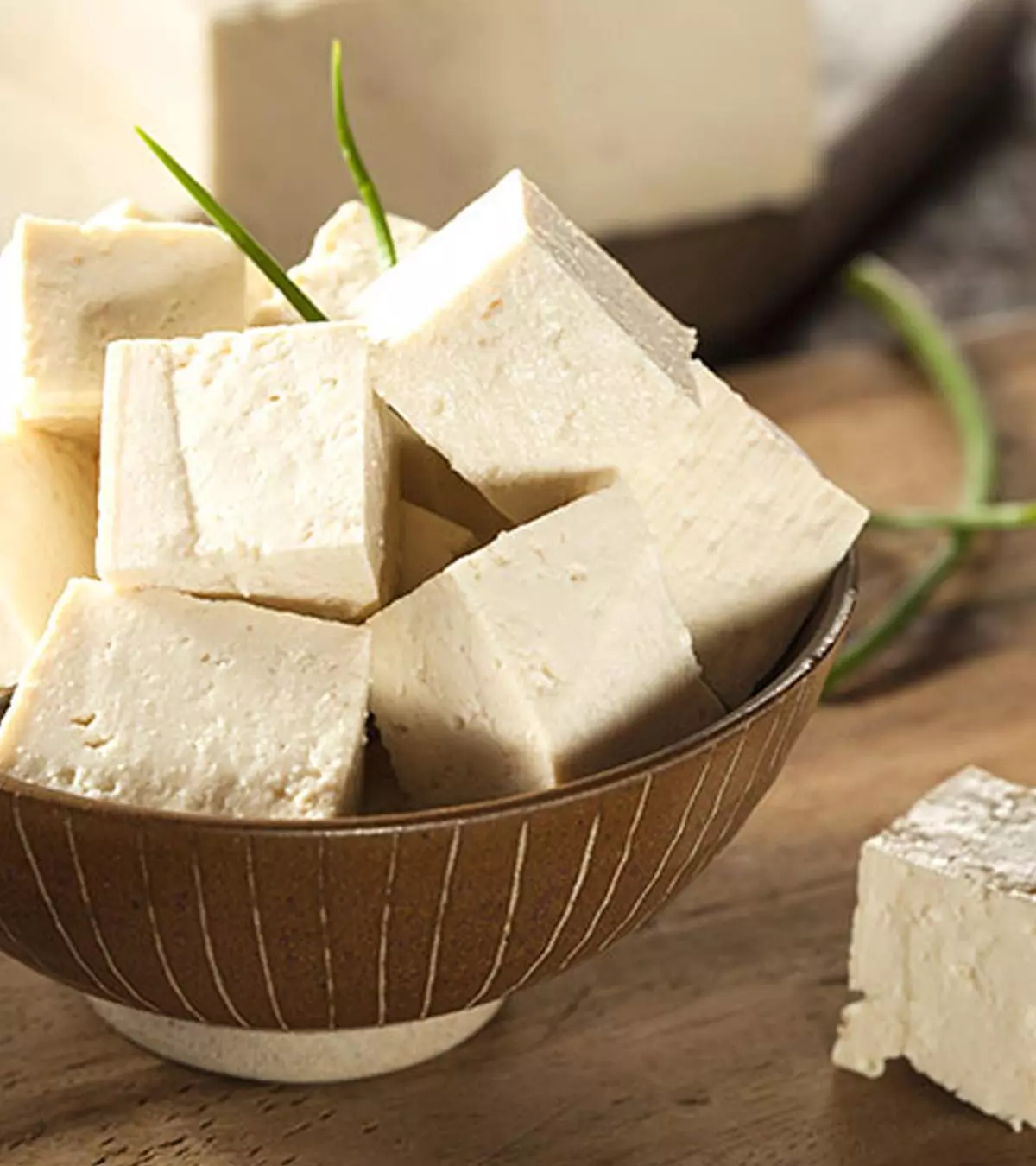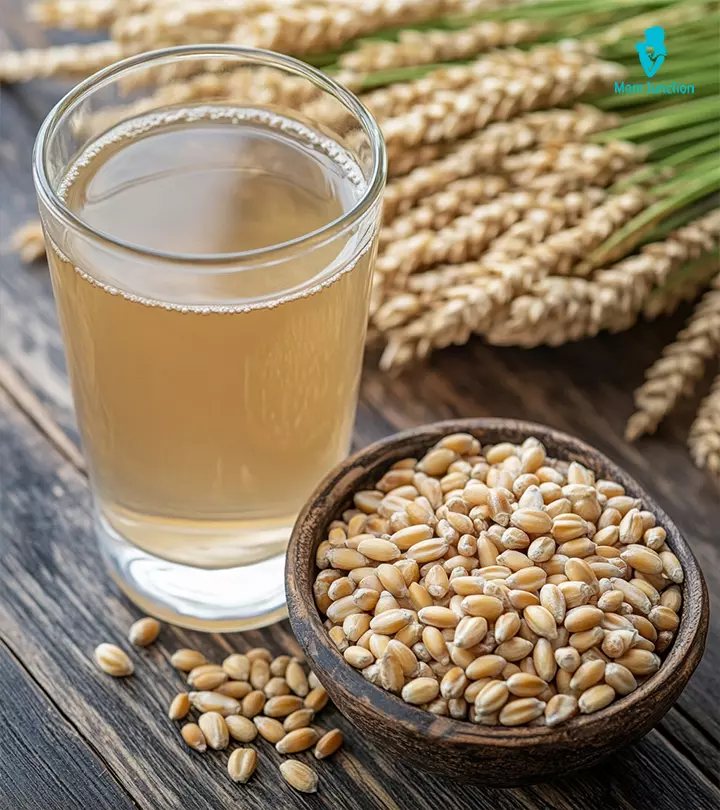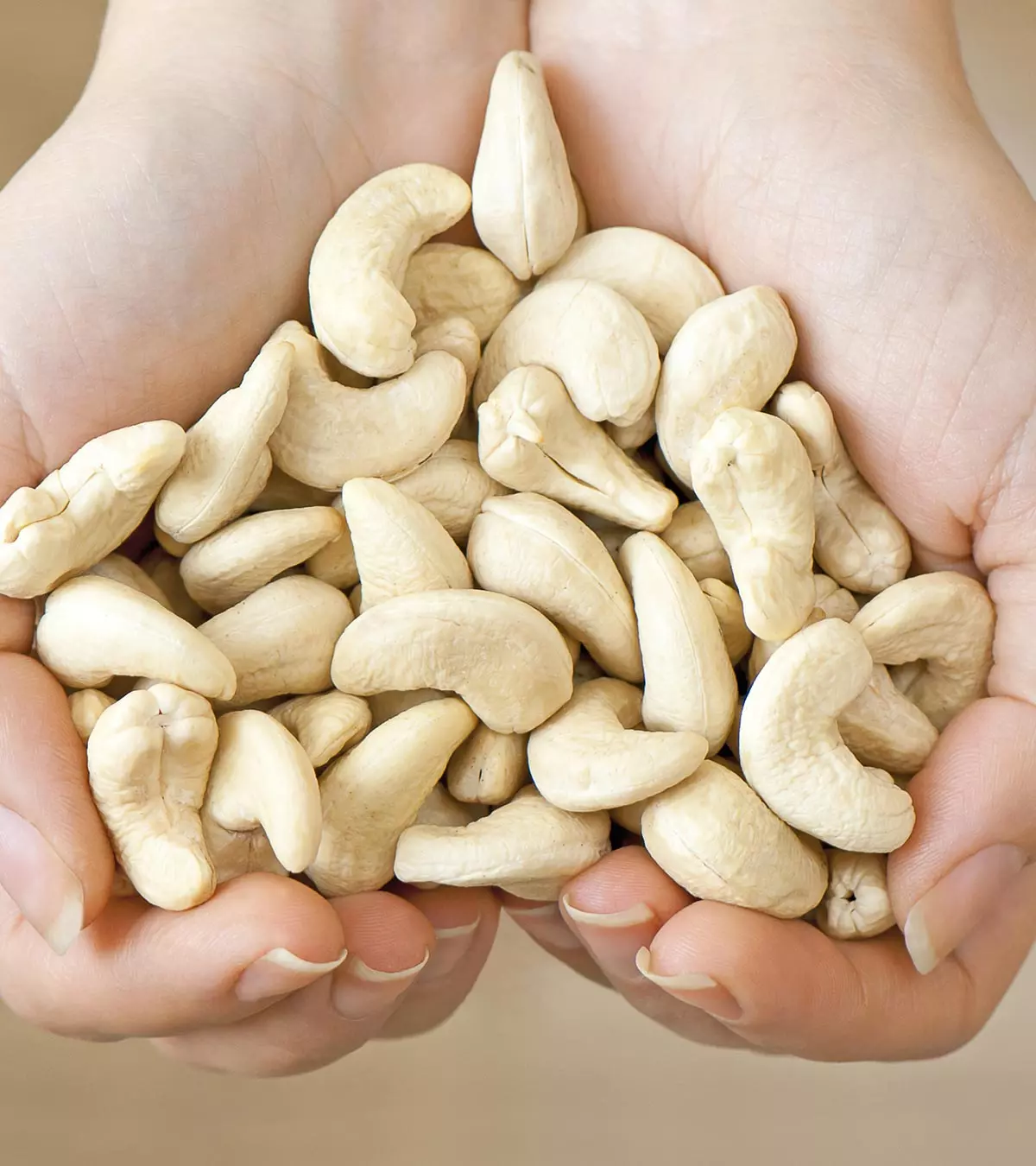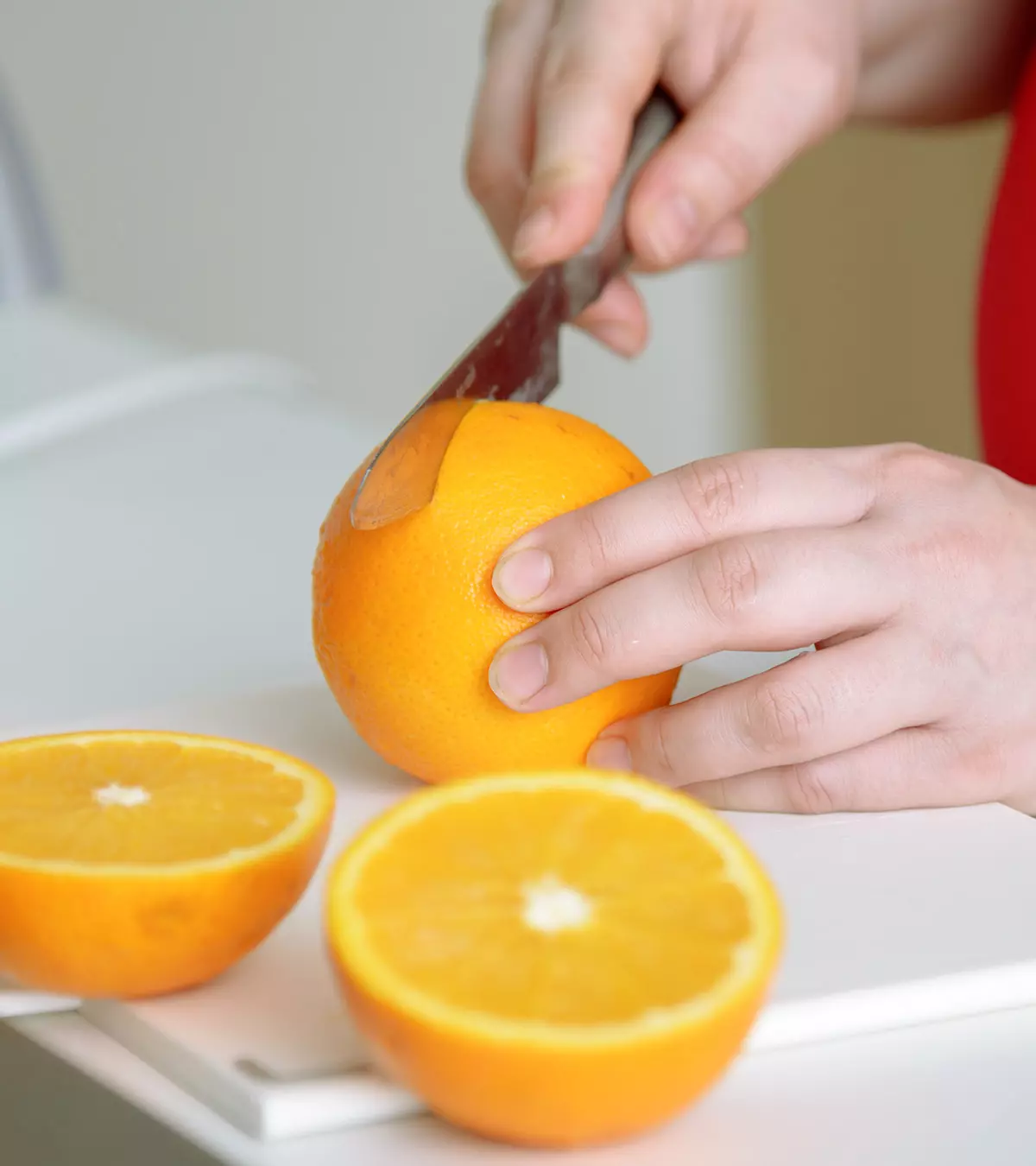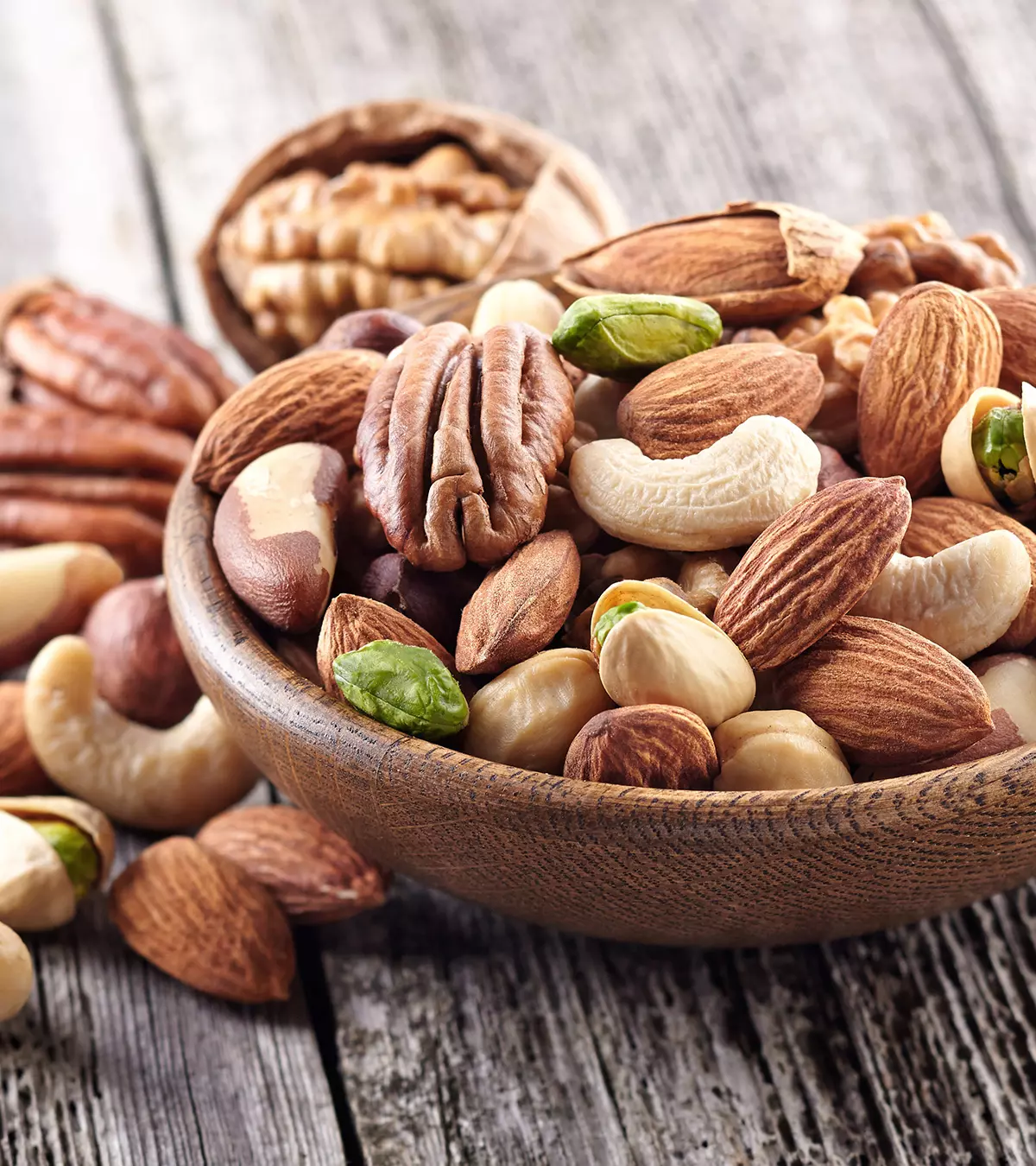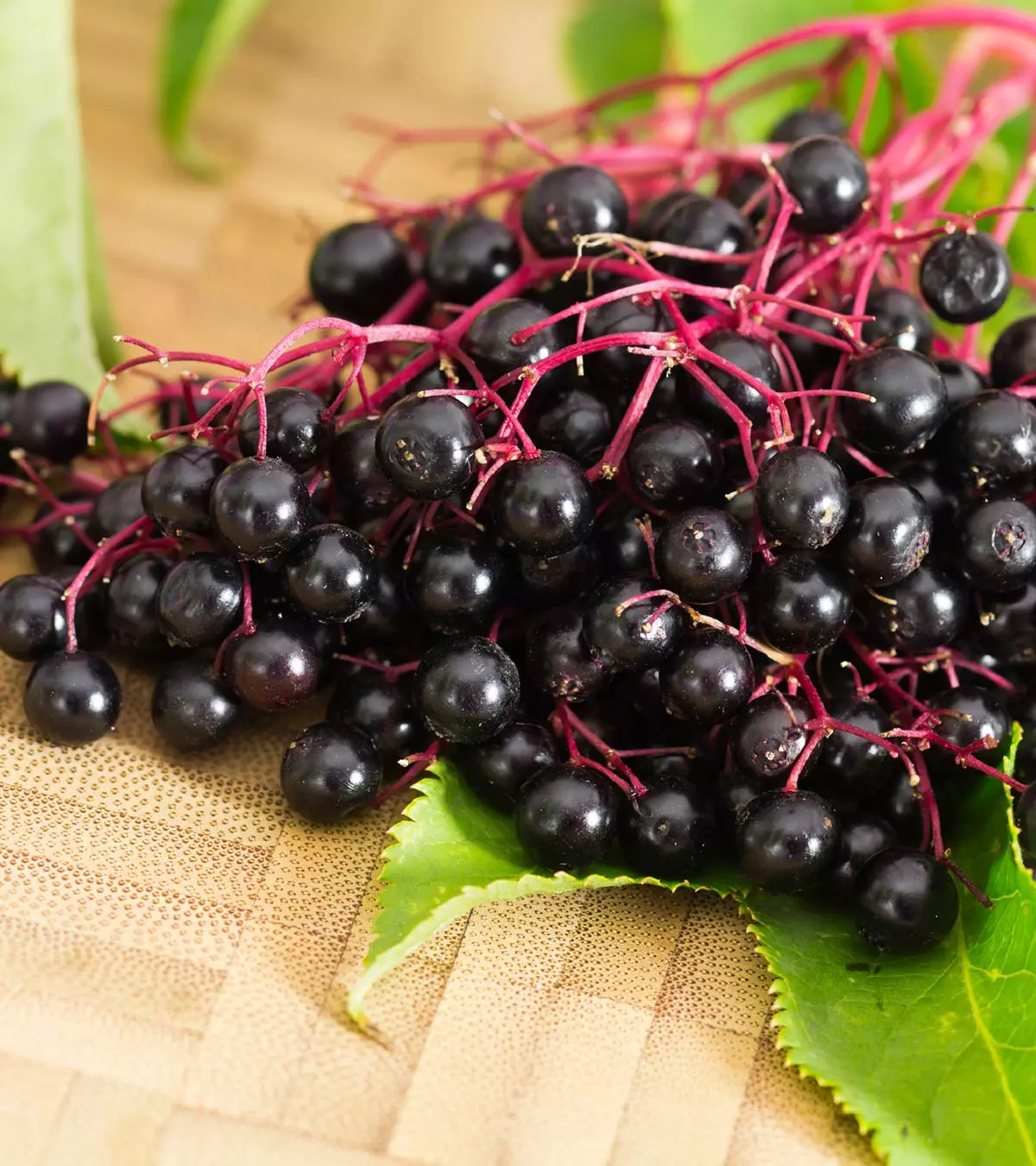
Image: iStock
Elderberry or elders are dark purple berries indigenous to Europe. Various parts of the Elderberry plant are used in traditional and folk medicine to treat cold, flu, and constipation (1). Although you can take Elderberry when pregnant, you should also exercise caution as consuming raw elderberries can adversely affect your health and that of your unborn baby.

Keep reading as we tell you about the safety of Elderberry for pregnant women, its health benefits and side effects, and the different ways you can consume elderberry when pregnant.
Key Pointers
- Ripe elderberries are safe to consume during pregnancy, but raw berries can cause nausea and vomiting.
- Elderberry consumption during pregnancy offers numerous health benefits like immunity boosting, improving vision, cardiovascular health, and treating infections.
- Elderberries can be consumed in the form of syrup, tea, juice, and jam but after consulting a doctor.
- Elderberry side effects during pregnancy may include nausea, vomiting, and exacerbating autoimmune diseases such as lupus, and multiple sclerosis.
Is Elderberry Safe During Pregnancy?
Yes, elderberries are considered to be safe during pregnancy, since there is no studies/ data collected indicating that they have any adverse side effects, drug interactions, and food or nutrient reactions in pregnant women.
Black elderberries, much like dark purple elders, are acknowledged for their ability to provide an immune system boost and are deemed safe for consumption. There are no studies suggesting they have adverse effects during pregnancy.
However, unripe berries are toxic and should be avoided, while the ripened ones should be consumed in moderation.
Health Benefits Of Eating Elderberry During Pregnancy
Elderberries contain significant amounts of vitamins, amino acids, and flavonoids, all of which help in staying healthy and preventing disease.
- Promotes respiratory health: Rich in bioflavonoidsiPolyphenolic substances with antioxidant activity found in plants, which add color and flavor to certain vegetables or fruits. such as anthocyanins, elderberries can soothe irritation and inflammation in the respiratory tract. Bioflavonoids also have expectorant properties that clear out phlegmiMucus, comparatively thicker than the usual, released from the respiratory system during coughing, generally during sickness. and promote respiratory health. Therefore, elderberries aid in clearing sore throat, cough, cold, bronchitis and other respiratory ailments (2).
- Boosts immunity: The immune system receives a boost from elderberries due to their antibacterial and anti-viral properties, as well as their high vitamin C and zinc content, which enable it to fight flu viruses more effectively. Berries also improve the production of cytokines, which is a new class of immune compounds.
- Strengthens bones: The richness of anthocyanins in elderberries makes it an anti-inflammatory and anti-oxidant food that alleviates pain and soreness of joints. High mineral content in berries promotes bone strength and reduces bone loss (3).
- Improves vision: Anthocyanin pigments found in elderberries are nutraceuticals that help maintain vision. Herbal remedies like these offer protection for eyesight and are usually associated with improving night vision (4).
- Improves cardiovascular health: High fiber content in elderberries helps in eliminating bad cholesterol from the body and promotes good cholesterol levels. The Centers for Disease Control and Prevention detailed that 13% of pregnant women are diagnosed with gestational hypertension. However, elderberry is known to minimize blood pressure and gestational hypertension, prevent the progression of atherosclerosisiHardening of the arteries due to accumulation of fats, cholesterol, and other substances. , minimizes blood pressure and gestational hypertension, safeguards the heart, and ameliorates glucose abnormalities to aid in managing gestational diabetes (5).
- Treats infections: Studies suggest that elderberry may benefit pregnant women and their unborn babies. Elderberry may reduce the risk of bacterial vaginosis, a common vaginal infection. In vitro studies show that elderberry extracts inhibit the growth of bacteria associated with urinary tract infections. Elderberry extract is also effective against Helicobacter pylori, a bacterium that causes ulcers and stomach inflammation. Another study suggested that elderberry may help prevent respiratory infections caused by viruses like influenza (8).
 Quick fact
Quick factConsuming Different Forms Of Elderberry During Pregnancy
Elderberry can be consumed in different forms, some readily available in the market and the others you can make yourself. Whatever you choose, contact your doctor before trying them.
1. Elderberry syrup:
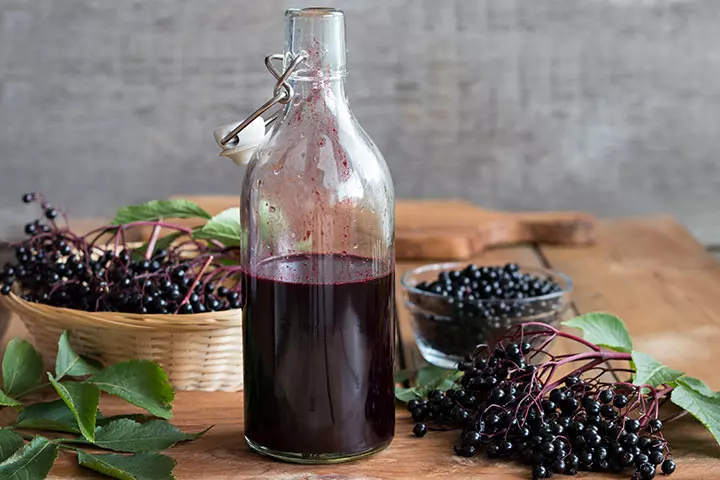
Elderberry syrup is known to fight cold and flu. It is a great immunity booster and is effective to use during pregnancy on doctor’s advice, especially for cold, flu and other respiratory issues (9).
You can make a simple elderberry syrup at home by combining berries with water and maple syrup or honey. Store it in the refrigerator, and take a spoonful of it every day to keep the infection away (10).
Michele Swaczyna, a mother of two children who uses several natural products as a part of her preventive and overall wellness care regime, says, “I take homemade elderberry syrup all the time, whether I am pregnant or not. It’s been really helpful for my whole family. I just take a teaspoon of it every single day for immune system support (i).”
2. Elderberry tea:
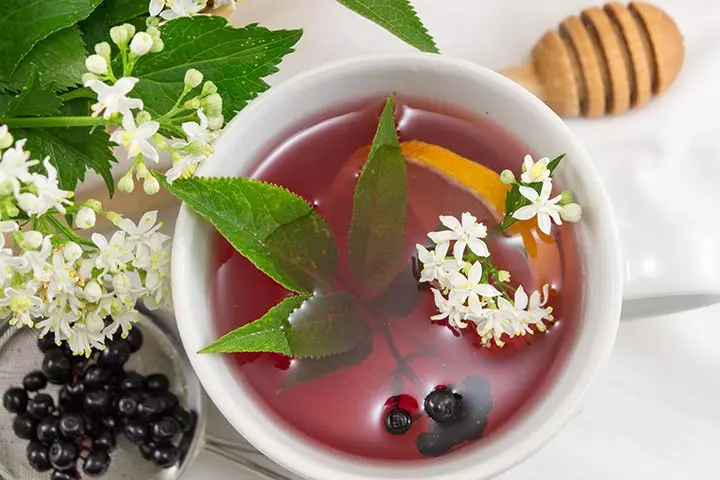
You can either use tea bags or one tablespoon of dried berries or flowers in eight ounces of water to make elderberry tea.
 Quick fact
Quick fact3. Elderberry juice:
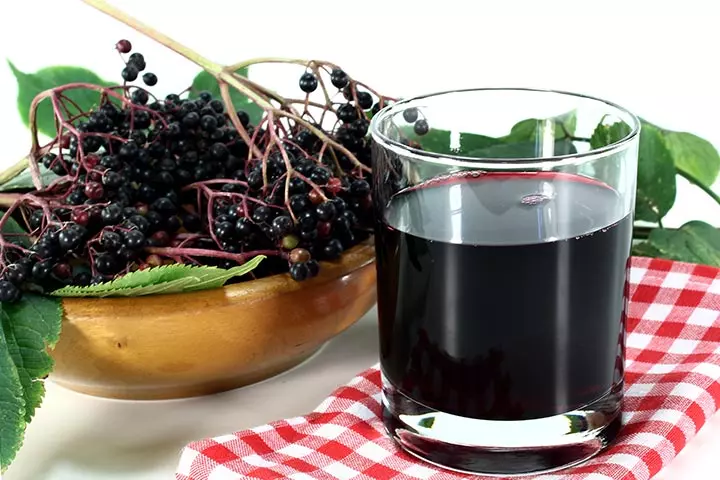
For elderberry juice, choose freshly made, that is sweet and tangy in taste. Do not consider packaged drinks as they contain too much sugar. According to the American Botanical Council, you can consume eight ounces of expressed elder juice twice a day (for 3 – 5 days) to beat cold and flu symptoms.
4. Elderberry lemonade:

Here’s a tasty alternative to straight-up elderberry juice. This refreshing drink brings together freshly squeezed lemon juice, organic honey, and elderberry syrup for a delicious and pregnancy-friendly treat.
You will need
- 1/2 cup freshly squeezed lemon juice
- 1/3 cup organic honey or any other natural sweetener
- 3 cups water
- 4tbsp elderberry syrup
How to make
- Blend water, lemon juice, and honey together in a pitcher. Stir the mixture until the sweetener completely dissolves.
- Mix the elderberry syrup directly into the lemonade base in the pitcher, ensuring thorough stirring.
- Taste the elderberry lemonade and adjust sweetness by adding more honey or increase the tartness with additional lemon juice, according to your preference.
5. Elderberry jam:
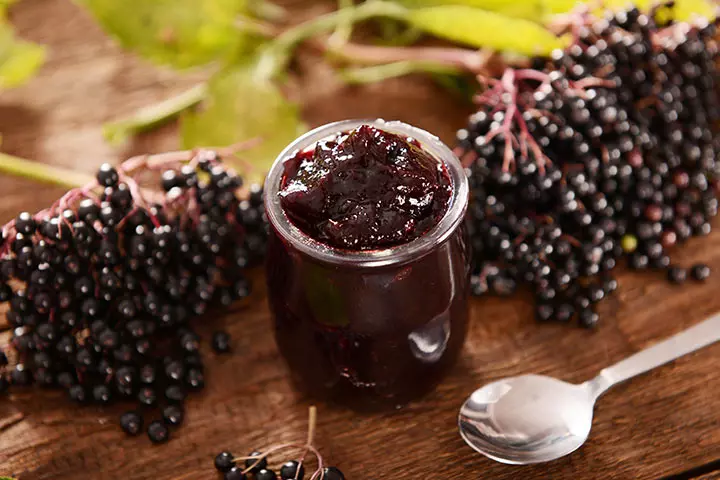
It is an excellent addition to fresh bread and butter, oatcakes, warm crumpets, rice pudding or Greek yogurt. You may also add it to muffins, pancakes, fruit salads and crumbles.
Simple recipe to make homemade elderberry jam
You will need
- 700 grams elderberries
- ½ a lemon’s juice
- 700 grams caster sugar
- 600ml jar
How to make
- Combine elderberries and lemon juice in a pan and cook over a medium heat.
- Once the juice starts to run and boil, simmer the heat and keep for 20 minutes. Take away the layer that forms on the surface.
- Add sugar and stir until it dissolves. Boil until it reaches a set point, which is 105° C. You can check the temperature using a sugar thermometer.
- Another alternative is to keep a couple of saucers in the freezer for 10 minutes and slice a spoon of jam to add into the cold saucers. Leave for 10 to 15 seconds and push with your finger. If it forms wrinkles, it has reached the setting point.
- Store the jam in a warm, sterilized jar, and close it tightly. Keep the jar in a dark and cool place.
6. Elderberry gummies:
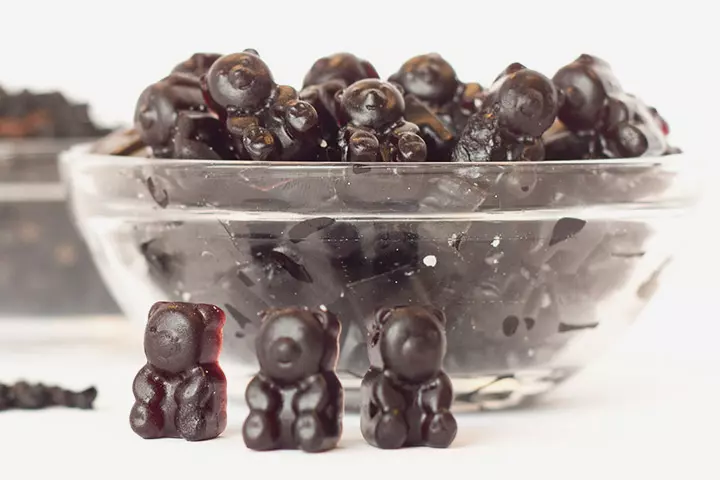
Gummies are a delicious way to consume the flu-busting antioxidants with the gut-healing properties of the fruit. To make them at home,
You will need
1 cup elderberry syrup
4tbsp unflavored gelatin
How to make
- Combine gelatin and syrup in a saucepan, and put over low heat. Whisk it frequently, heat until the gelatin dissolves.
- With the use of an eye dropper, transfer the mixture into molds made of silicone. Refrigerate, and allow it to solidify for about 30 minutes.
- Remove gummies from the molds, and store them in an airtight jar.
What Are The Side Effects Of Taking Elderberry While Pregnant?
Besides its powerful benefits, there are certain side effects that should be kept in mind while consuming it. Ripe and cooked berries are safe to consume. However, you should not eat raw or unripe berries in any form.
- Raw elderberries contain bitter alkaloidsi A group of organic nitrogen occurring naturally within the bio-process as the defense system. , sambucine, and hydrocyanic acid, which will cause vomiting and nausea during pregnancy. These alkaloids are less in ripe berries, and are destroyed when cooked (11).
- Another safety concern involves autoimmune diseases. If you are already experiencing lupusiA condition in which the immune system attacks its tissues, causing inflammation. , rheumatoid arthritis, Crohn’s diseaseiA chronic inflammatory condition that affects the digestive system, causing abdominal pain, diarrhea, and weight loss. , and multiple sclerosisiA disorder of the central nervous system that causes problems of speech, coordination, and vision, numbness, and walking difficulties. , taking elderberry stimulates the nervous system, thus intensifying the disease symptoms (12).
, a prenatal dietitian from Springfield, New Jersey, recommends, “Anyone taking steroid medication or medications to treat multiple sclerosis, psoriasis, rheumatoid arthritis, ulcerative colitis, or Crohn’s during pregnancy should consult their doctors before taking elderberry.”
- Some studies have shown that elderberry could cause a harmful reaction called a cytokine storm. But the current research that has been done outside of the body (ex vivo) is not enough to fully understand this.
- Research evidence suggests that elderberry may cause an allergy, therefore it should be consumed with caution.
 Caution
CautionFrequently Asked Questions
1. Can I consume elderberries every day during pregnancy?
Moderate consumption of elderberries is generally considered safe. However, its safety and efficacy for expecting women are not well known. Hence, pregnant women should seek medical guidance before making elderberries a part of their daily diet.
2. Are elderberry gummies or supplements safe when pregnant?
Nutritional supplements like elderberry gummies are generally considered safe. However, due to a lack of research on their safety and efficacy, it is imperative to speak with a healthcare provider before consuming them. The provider will help ascertain the product’s safety and recommend a safe dosage for you.
3. Is elderberry syrup safe during pregnancy?
Elderberry syrup is generally considered safe and beneficial to treat several ailments, such as upper respiratory tract infections. However, due to a lack of conclusive scientific evidence about its safety and efficacy for pregnant women, it is best to have elderberry syrup in moderation only after consulting your doctor.
4. Is elderberry tea safe when pregnant?
Elderberry tea can be a refreshing beverage. However, its safety for pregnant women is not well studied. Hence, it is better to take elderberry tea or other elderberry derivatives only after consulting your doctor (13).
It is safe to consume elderberries while pregnant, and there is no scientific evidence to prove its adverse effects. Elderberries are rich in amino acids, essential vitamins, and flavonoids. These substances help to boost immunity and prevent diseases. They are also known to promote respiratory health, provide bone strength, improve vision, and promote cardiovascular health. You may consume syrup, jam, juice, or gummies made of elderberry or fresh berries directly, in tea, or in other recipes. It is better to use sugar-free forms of stored berries to avoid excess calorie intake.
Infographic: Health Benefits Of Eating Elderberry During Pregnancy
Before you include anything in your pregnancy diet, it is important that you know about its benefits and possible side effects. In the following infographic, we have included a list of benefits of elderberry that you could reap with its consumption. Do give it a read and share it with family and friends.
Some thing wrong with infographic shortcode. please verify shortcode syntax
Illustration: Can You Take Elderberry During Pregnancy?

Image: Stable Diffusion/MomJunction Design Team
Elderberry is a storehouse of nutrients. Learn how to make delicious elderberry syrup with these easy steps.
Personal Experience: Source
MomJunction articles include first-hand experiences to provide you with better insights through real-life narratives. Here are the sources of personal accounts referenced in this article.
i. Pregnancy supplements | Natural | Vegan;https://www.youtube.com/watch?si=ByoO2kdiWlUlfy0T&v=hQY69ySTRSw&feature=youtu.be
References
- European Elder; National Center for Complementary and Integrative Health (2016)
https://www.nccih.nih.gov/health/elderberry - Tamyra Comeaux; The Definitive Guide to Natural Pregnancy Health; p. 42
https://books.google.co.in/books?id=5R-A6NwVzbEC&pg=PA42&lpg=PA42&dq=elderberry+syrup+safe+during+pregnancy&source=bl&ots=4CzLHz88ru&sig=6vrKTnxuWRuLBun6NrKHuAKbFjM&hl=en&sa=X&ved=0CFoQ6AEwCTgKahUKEwjPstGv3c7IAhUFI44KHdr5Dyc#v=onepage&q=elderberry%20syrup%25&f=false - C. Krawitz et al.; Inhibitory activity of a standardized elderberry liquid extract against clinically-relevant human respiratory bacterial pathogens and influenza A and B viruses; BMC Complement Altern Med (2011)
https://www.ncbi.nlm.nih.gov/pmc/articles/PMC3056848/ - Michael Castleman; The New Healing Herbs: The Essential Guide to More Than 125 of Nature’s Most Potent Herbal Remedies; p. 197
https://books.google.co.in/books?id=mlyszsVFQ1kC&pg=PA197&dq=elderberry+boosts+immunity&hl=en&sa=X&ved=0CDgQ6AEwAmoVChMI_sz3wb3PyAIVl8SOCh1F7Qkp#v=onepage&q=elderberry%20boosts%20immunity&f=false - L. Badescu et al.; Mechanism by Sambucusnigra Extract Improves Bone Mineral Density in Experimental Diabetes; Evid Based Complement Alternat Med (2012)
https://www.ncbi.nlm.nih.gov/pmc/articles/PMC3450936/ - H. E. Khoo et al.; Anthocyanidins and anthocyanins: colored pigments as food pharmaceutical ingredients and the potential health benefits; Food Nutr Res (2017)
https://www.ncbi.nlm.nih.gov/pmc/articles/PMC5613902/ - A. Basu et al.; Berries: emerging impact on cardiovascular health; Nutr Rev (2010)
https://www.ncbi.nlm.nih.gov/pmc/articles/PMC3068482/ - Christian Krawitz et al.; Inhibitory activity of a standardized elderberry liquid extract against clinically-relevant human respiratory bacterial pathogens and influenza A and B viruses; BMC Complement Altern Med (2011)
https://www.ncbi.nlm.nih.gov/pmc/articles/PMC3056848/ - E. Tiralongo et al.; Elderberry Supplementation Reduces Cold Duration and Symptoms in Air-Travellers: A Randomized Double-Blind Placebo-Controlled Clinical Trial; Nutrients (2016)
https://www.ncbi.nlm.nih.gov/pmc/articles/PMC4848651/ - Common Elderberry; USDA & NRCS (2003)
https://plants.usda.gov/plantguide/pdf/cs_sanic4.pdf - ELDERBERRY; Natural Medicines Comprehensive Database (2018)
https://plants.usda.gov/plantguide/pdf/cs_sanic4.pdf - The ABC clinical guide to elder berry (2004)
http://cms.herbalgram.org/press/files/elderberry-scr.pdf - Essential Facts for Elderberry.
https://www.herbsociety.org/file_download/inline/2084e920-b3bf-48da-8596-037fd76e46b7 - Lone Holst, Gro C Havnen, Hedvig Nordeng; Echinacea and elderberry-should they be used against upper respiratory tract infections during pregnancy?;
https://pubmed.ncbi.nlm.nih.gov/24624087/
Community Experiences
Join the conversation and become a part of our nurturing community! Share your stories, experiences, and insights to connect with fellow parents.
Read full bio of Reda Elmardi
- Katie is a prenatal registered dietitian who takes a food-first non-diet approach in her virtual 1-on-1 practice. She is the owner of The Pregnancy RD, an online diet consultancy service.
 Katie is a prenatal registered dietitian who takes a food-first non-diet approach in her virtual 1-on-1 practice. She is the owner of The Pregnancy RD, an online diet consultancy service.
Katie is a prenatal registered dietitian who takes a food-first non-diet approach in her virtual 1-on-1 practice. She is the owner of The Pregnancy RD, an online diet consultancy service.
Read full bio of Swati Patwal
Read full bio of Rebecca Malachi
Read full bio of Reshmi Das







